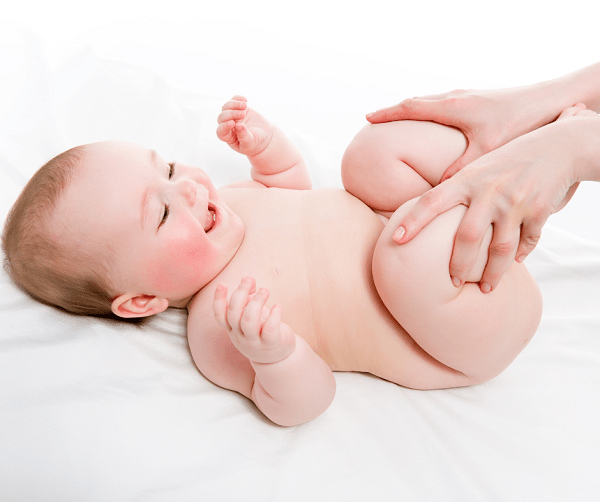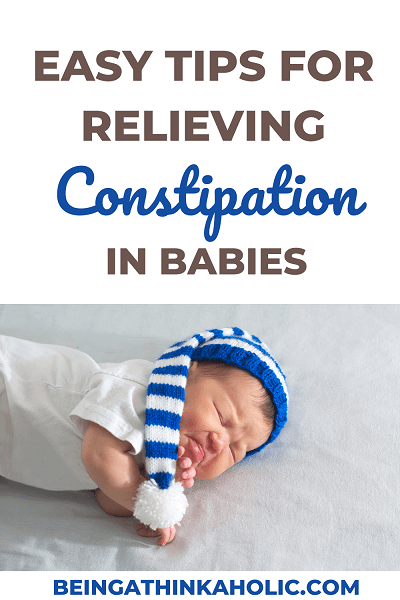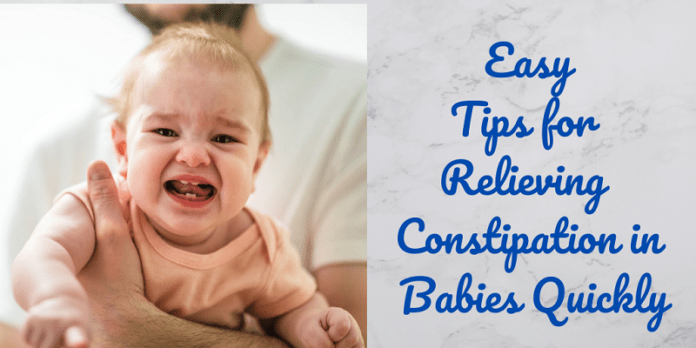Parenting a baby is not easy and with a newborn it gets tougher. As a new parent, you are always looking out for signs and cues to ensure your little one is fine. There are several things you need to monitor when you have a newborn in your life.
One thing that many parents do not know they will need to monitor is poop. Infant constipation is common and relieving constipation in babies who cannot even tell you is a task sometimes. There are home remedies for constipation in babies which are easy and extremely effective.
Before we start to talk about how to relieve constipation in babies quickly, let us first understand the signs and symptoms and the causes.
Table of Contents
Infant Constipation
Constipation in babies is defined as the kid passing less than two stools in a week or when he is facing difficulty in pooping. No two kids are the same and thus, you should monitor your child’s routine and if you see massive deviations, it is better to take necessary actions.

How Do I Know If My Baby is Constipated?
When a child is born, it is normal for them to pass stool once a day or even several times a day, but the frequency decreases to once in a few days. The abdominal muscles are weak and thus, most kids go red or cry when they are trying to pass stool. Thus, any difficulty in bowel movement is not a sign of constipation. As long as the stool is not hard, the baby is fine.
The following are the signs you can look for if you want to know if the baby is constipation and then look for tips for relieving constipation in babies.
- Uncomfortable or having problem in bowel movements
- Being cranky and fussy
- Dry and hard stools
- Blood in the stool
- Infrequent stools
- Belly swollen with gas
- Cramps and stomach pain
- Hard belly
The bowel schedule of a baby drastically changes when they start eating solids.

If your baby is less than 6 months and you are thinking of introducing solids, read a Comprehensive guide on introducing solids to babies.
What Causes Constipation in Babies?
Babies less than 6 months are only on breastfeed or formula. Most doctors say that exclusively breastfed babies have lesser chances of being constipated though it is possible. On the other hand, there are higher chances of formula-fed babies to get constipated.
As compared to breast milk, a formula feed has more chances of firming the poop. Dehydration has a lesser probability in kids less than 6 months as they get enough liquids in the breast or formula feed.
Some causes of constipation in babies are:
Wrong Formula Preparation
While preparing formula, always add water first and then the formula to ensure it is not concentrated

Solids Before 4 Months
Babies less than 4 months of age are not capable of digesting solids. If cereal is introduced before that age, there are higher chances of infant constipation.
Allery or intolerance
A breastfed baby sometimes can be allergic to any food the mom eats and this can be a cause of infant constipation. Formula milk on the hand has some proteins and infants can be allergic to them which makes it difficult for them to pass stool.
Little Miss A was on a mixed feed and many people told us that the iron in the formula causes constipation. This is usually not the case. However, if you have a doubt ask your pediatrician. Iron is important for the growth of a baby and thus, shifting to a low iron formula is not recommended without consulting the doctor.
Read the post, Common Misconceptions on Formula Feeding
When kids start solids, the chances of them being constipated are high. Many kids when being potty trained learn to hold their bowel movement, and this also causes constipation.
If you are a mother to a baby in diapers and are wondering when to start potty training, you should read the post, The Right Age to Start Toilet Training.
Infant constipation and constipation in babies are usually not severe and some easy tips can be used for relieving constipation in babies.
How Long Can a Baby Go Without Pooping?
Once a baby is 2-3 months they can go 4-5 days without pooping. In some cases, it has been seen that breastfed babies do not poop for 2 weeks. The reason behind this is that breastmilk has all the nutrients that the baby needs for growth and thus, there is less waste. They can go without pooping for 2 weeks but that does not mean they are constipated.
Formula-fed babies can feel constipated and have problems in passing a stool. However, it is easy to provide relief quickly.
Home Remedies for Relieving Constipation in Babies
Seeing a baby suffer and not being able to communicate is the worst for a parent. Relieving constipation in babies is a priority for parents and thus, most parents look for how to relieve constipation in babies quickly. Let us look at some simple and easy home remedies for constipation in babies:
Tips for Relieving constipation in babies less than 6 months
Exercise (leg bicycle)
Doctors say that moving a baby’s leg can help in relieving constipation in babies. Any exercise provides stimulation and helps in bowel movements. Adults can exercise on their own, but in the case of an infant, parents will need to help them. The simplest way is to move their legs in the manner of riding a bicycle.

Massage
Massaging a baby is one of the best and most effective ways to relieve constipation in babies. This is one of the easiest home remedies for constipation in babies. Some of the easiest strokes are:
- Using your fingers make a circular pattern in a clockwise manner on the baby’s tummy
- The ILU technique
- Massaging around the navel gently in a clockwise manner
- Holding the baby’s legs and moving them towards the stomach
There are many benefits of massaging a baby. To know more, read, Baby Massage: Benefits and Techniques
Change formula
Constipation in formula-fed babies is common and thus, relieving constipation in babies is important. One of the first things that can be done is to change the formula. Ideally, before shifting to a dairy-free or iron-free formula, you must consult your pediatrician.
Change mom’s diet
For a baby less than 6 months and who is exclusively breastfed, one of the main reasons for constipation can be something in the diet of the mom. Dairy is an issue with many and moms need to try and find out what is that they eat that does not suit the baby.
Hing or Asafetida
Hing has natural laxative properties which makes it a very good home remedy for constipation in babies. Since kids usually do not like the taste of hing rather than giving orally, try massaging it lightly on to the navel region of babies.
Take a pinch of hing and mix it with slightly warm mustard oil or water and apply around the navel. This provides instant relief from bloating and is also effective for colic. As a first time mother, this trick helped a lot when Little Miss A would keep crying.
Warm bath
The abdominal muscles get relaxed with a warm bath. There is some relief to the discomfort and the bath helps in reducing the strain the baby feels.
Relieving Constipation in Babies More than 6 months
The above remedies work for babies older than 6 months. For kids this age, relieving constipation in babies is easier as they can start eating solids. Let us discuss some more home remedies for constipation in babies who have started solids:
Papaya
Papaya is a very effective home remedy for constipation in kids. For kids, over 6 months of age papaya can be given in the form of pulp, chunk or puree. However, parents need to be careful while giving kids papaya as too much can cause diarrhea.

Prunes
Prunes are very effective in relieving constipation in babies and adults too. For babies, it can be given as juice or a puree. You can find some good prune recipes here.
Pear, plums and peaches
Pears, plums and peaches are all very good fruits for relieving constipation in babies. They can be given as mashed, puree or chopped depending on the baby’s age and comfort. These fruits have fiber which helps in regulating the bowel movement.
Warm water
Once the baby starts solids, they are allowed to drink water too. A sip of warm water can be given at regular intervals and this helps in relieving constipation in babies.
Fruit juice
Giving fruit juices rich in fiber is a very good home remedy for constipation in babies. Kids love juices so it’s not much of a hassle making them drink that. Apple, prunes, plums, grapes, etc. can all help relive constipation.
Raisins
Raisin water is one of the safest and easiest home remedies for constipation in babies. Wash the raisins well and soak them in drinking water overnight. In the morning squeeze the raisins and give the water in small doses from time to time or according to the age of the baby. For small babies, you can give them in small quantities every 1 to 2 hours.

Does Gripe Water Help with Constipation?
Many parents use gripe water for helping with gas and constipation. Gripe water should not be given without discussing with the pediatrician and if you are giving it check the ingredients carefully. To know everything about it, read this detailed post on Grip Water.
Food to Avoid When Relieving Constipation in Babies
While relieving constipation in babies, there are some foods that must be eliminated from the baby’s diet if they are struggling with bowel movements. Some of these are:
- Avoid BRAT- Bananas, Rice, Apple and Toast
- Potatoes and carrots
- Any food which is processed or has white flour
- Red meat
- Excess dairy products
Final Words on Relieving Constipation in Babies
As parents, relieving constipation in babies, is important. Most parents look for home remedies for constipation in babies. Treating infant constipation can be tougher as no oral things can be given. However, there are some simple ways on how to relieve constipation in babies quickly. If the problem persists, always consult the pediatrician.
Important Note:
- Not all home remedies work for all babies so you will need to see what works for yours
- For any problem that persists, do not rely on home remedies and consult your doctor
- If you notice any traces of blood in the stool, immediately talk to your doctor
- For babies below one year, sugar, cow milk and honey should not be given
- Always check for allergies if you are introducing any new food to your baby. For this give a little and leave for a day or two to check allergic reactions. The rule is the same when introducing solids to babies.




